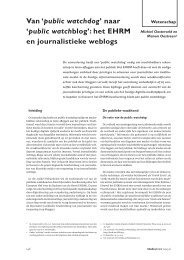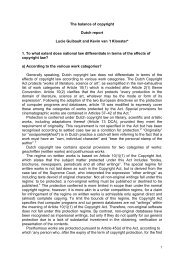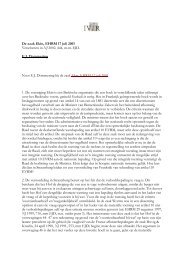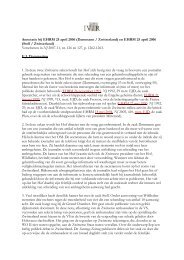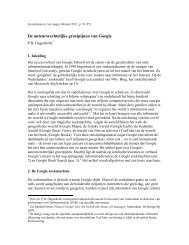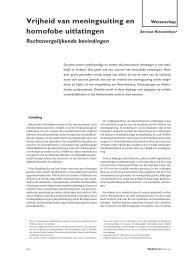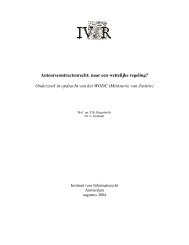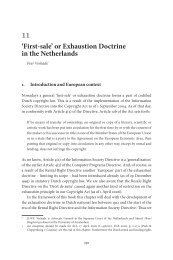ADAPTING COPYRIGHT TO THE INFORMATION ... - IViR
ADAPTING COPYRIGHT TO THE INFORMATION ... - IViR
ADAPTING COPYRIGHT TO THE INFORMATION ... - IViR
Create successful ePaper yourself
Turn your PDF publications into a flip-book with our unique Google optimized e-Paper software.
One of the most pressing problems to emerge from the previous paragraphs is the<br />
potential proliferation of exclusive rights pertaining to acts of digital communication.<br />
Applying a broad notion of `reproduction', every such act - including transmission,<br />
reception and use - would be restricted. Arguably, a copyright of such an allencompassing<br />
nature would be counterproductive and unduly restrictive to the<br />
information trade.<br />
Moreover, an `all-inclusive' copyright would be difficult to reconcile with basic<br />
European Union freedoms. The dissemination of information through the superhighway<br />
will not stop at national boundaries. In many cases the information provider will be<br />
located in one Member State, whereas the end user is located in another Member State.<br />
In addition, the server or host might be located in a third Member State. If every act of<br />
disseminating a protected work through the network would qualify as a restricted act, the<br />
freedom to provide transborder information services might be severely hampered by<br />
exclusive intellectual property rights exercised on a national territorial basis. This would<br />
undermine the creation of a European information market.<br />
In reviewing the scope of the exclusive right, we should take a close look at the<br />
`exhaustion' (i.e. first sale) principle: does it apply in the digital networked environment?<br />
At present, copyright laws in many Member States provide for a right of distribution in<br />
respect of material copies of the protected work. Once these copies have been brought<br />
into circulation by or under license of the copyright owner, subsequent (secondary) acts<br />
of distribution, rental not included, fall outside the scope of the copyright monopoly<br />
(national exhaustion).<br />
A similar exhaustion rule has been developed by the European Court of Justice in respect<br />
of transnational distribution of goods protected by intellectual property rights (European<br />
exhaustion). 30 According to the Court's interpretation of Articles 30 and 36 of the EC<br />
Treaty, absent harmonisation of intellectual property rights at the community level, the<br />
`specific subject-matter' of intellectual property does not justify the exercise of<br />
distribution or importation rights on a per-country basis. Thus, the distribution right is<br />
exhausted in the entire Community, whenever a product is put on the market in a<br />
Member State by or under license of the rightholder. In other words, the distribution<br />
right can be exercised only once: in the Member State where the copies are first<br />
circulated, the `country of origin'.<br />
4.1 Exhaustion theories<br />
Of course, the exhaustion doctrine has its roots in `the technological paradigm of<br />
printing'. 31 Should this principle be applied in a similar manner in the digital networked<br />
environment? Prior to answering this question, we shall take a brief look at the rational<br />
underpinnings of the exhaustion rule 32 :<br />
Ownership theory<br />
30 Cf. e.g. European Court of Justice, Judgement of 20 January 1981, Cases 55/80 and 57/80 (Membran &<br />
K-Tel), 2 CMLR 44.<br />
31 Cf. U.S. Congress, Office of Technology Assessment, Intellectual property rights in an age of<br />
electronics and information, Washington D.C., 1986, 205.<br />
32 [note: exhaustion theories]


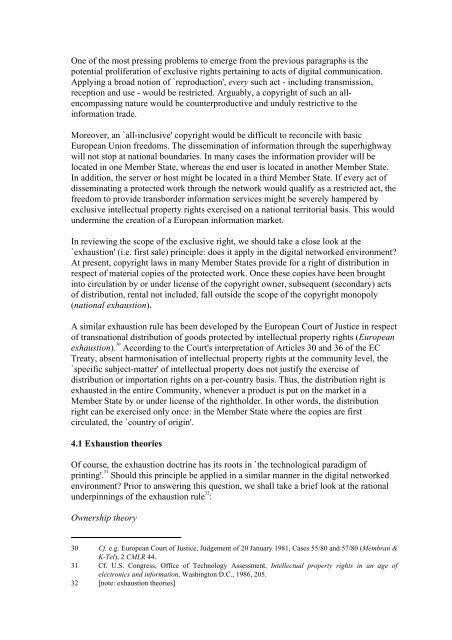
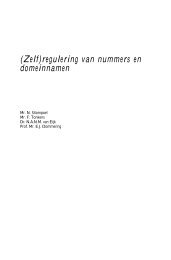
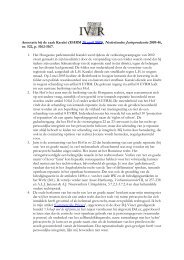
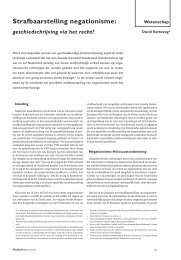
![Legal Opinion of Professor Egbert Dommering [1] concerning ... - IViR](https://img.yumpu.com/23603085/1/184x260/legal-opinion-of-professor-egbert-dommering-1-concerning-ivir.jpg?quality=85)
